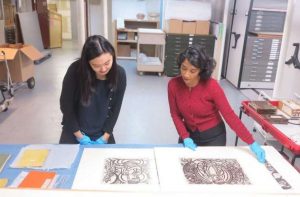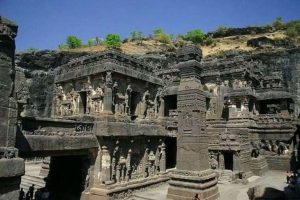In the Commentary on the Contemplation Sutra, Master Shandao opened the door to Amitabha’s Pure Land based on two teachings of two Buddhas. One is known as the Path of Importance expounded by Shakyamuni Buddha, and the other is the Path of Great Vow by Amitabha Buddha with his alternative intent.
As discussed in my last article, though the final achievement or reward of the practices in the two teachings is the same as both of them can lead us to be reborn in the Land of Bliss, the rebirth in the Path of Great Vow is based on the 18th vow, while that in the Path of Importance is based on the 19th vow of Amitabha Buddha. The rebirth that takes place in this world in the former scenario is regarded as the ‘assured rebirth in present life’ and ‘non-retrogression achieved in this life’ and the latter is regarded as the ‘assured rebirth near death’ and ‘non-retrogression achieved in next life.’
In other words, if one follows and performs exactly what the 18th vow stipulates, one is assured of rebirth in the present life by Amitabha Buddha, and one can achieve non-retrogression in this life. However, if one follows and performs in accordance with the 19th vow, one is not assured rebirth in present life, but is only assured near the end of one’s life by Amitabha Buddha, and cannot achieve non-retrogression in this life, but only achieve in next life.
Therefore, the chance of being reborn in the latter scenario is much less, because the practitioner is required to resolve his mind to be reborn in the Land of Bliss and keep invoking Amitabha Buddha at this critical moment. However, it is out of his control as he does not knows when he dies and what happens near his death. Thus his rebirth in the Land of Bliss in the present life is uncertain.
Those who hear the Buddha’s teachings in this life can be assured of rebirth in the present life if they follow the 18th vow, and be assured of rebirth near death if they follow the 19th vow. However, those who are assured rebirth near death must follow the 18th vow upon hearing the Buddhist teachings, particularly Amitabha’s name near the end of their life. The differences in the assured rebirth in the present life and near death in this world (the Saha World) have been discussed in my previous article.
There is another major difference in the rebirth between the two teachings, but it takes place in the Land of Bliss, not in the Saha Land.
Birth by womb and Birth by manifestation
Another important difference between the two paths is the mode of rebirth in the Pure Land. If a practitioner practices and follows the Path of Importance, even when he gets the chance to be reborn in the Pure Land, he will be reborn in the ‘embryonic state’ or in the form of womb. It is said to be ‘birth by womb’ because the practitioner will be born inside a celestial lotus bud and will live there for a certain period of time before it blossoms and opens into the paradise of the Pure Land.
The deceased’s flower will eventually blossom after a certain period of time, when he clears all obstructions of doubt and attains the deep meditation (samadhi) upon the entry of the compassionate Bodhisattvas in his bud. In other words, his lotus flower will blossom only if he recognizes his sins and develops faith in the Buddha’s wisdom and power (other-power) and no longer attempts to practice any assorted virtues in his own effort (self-power).
Why are some of the inhabitants of the Land of Bliss reborn in the embryonic state? Master Shandao said in the Commentary of the Contemplation Sutra,
“One should practice with the proper cause [of Amitabha’s deliverance], not the assorted virtues with doubt. Though these beings can be reborn in this way, their flowers have not yet blossomed, or they may be reborn in the border or fall in the palace in an embryonic state. They will not blossom until they clear all obstructions of doubt and attain the deep meditation (Samadhi) of flower blossom upon the entry of the compassionate Bodhisattvas in their buds. At that time, their bodies will become splendid. They can accompany the bodhisattvas to visit the Buddha.”
The details of the ‘embryonic’ rebirth of nine levels in three grades are discussed in the Contemplation Sutra. Master Shandao also explained clearly the causal conditions of each level of ‘embryonic’ rebirth in his Commentary on the Contemplation Sutra.
Conversely, if a practitioner practices and follows the Path of Great Vow, he will be reborn in the Pure Land by manifestation. It means that he is born in the immediate blossoming of lotus flower. He attains the state of non-retrogression and enters directly the Reward Land (the Land of Bliss). No grade or level of rebirth is required if one is to be reborn by the great vow and pure karmic power of Amitabha Buddha as an augmentative cause. Rebirth of ordinary beings in the Pure Land’s Realm of Rewards is another characteristic of the Path of Great Vow. The reward of exclusive Amitabha-recitation is incredible!
The Infinite Life Sutra also says: “There are sentient beings who believe and accept these kinds of wisdom, from the Buddha’s wisdom to the supreme wisdom, do meritorious deeds and sincerely transfer the virtues, and changed to having faith [on Amiatbha] . Those beings will be born by manifestation naturally and be seated with legs crossed, in the seven-jeweled lotus-flowers, and instantly attain the same splendid forms, wisdom and virtues as those of other bodhisattvas there.”
The cause of the two kinds of birth in the Land of Bliss
Why is there a big difference between the two kinds of rebirth? Let’s refer to the Infinite Life Sutra. It explains the cause of the two kinds of birth as follows:
Then, the Bodhisattva Maitreya said to the Buddha, World-Honored One, for what reason are some of the inhabitants of that land in the embryonic state and the others born by transformation?
The Buddha replied, Maitreya, if there are sentient beings who do various meritorious deeds aspiring for birth in that land while still entertaining doubt, such beings are unable to comprehend the Buddha-wisdom, inconceivable wisdom, ineffable wisdom, boundless Mahayana wisdom, and incomparable, unequaled, and unsurpassed supreme wisdom.
Some of them doubt these wisdoms, and they still believe in retribution for evil and reward for virtue and so cultivate a stock of merits, aspiring for birth in that land. Such beings are born in a palace, where they dwell for five hundred years without being able to behold the Buddha, hear his exposition of the Dharma, or see the hosts of bodhisattvas and shravakas. For this reason, that type of birth in the Pure Land is called embryonic state.”
In this paragraph, we learn that the difference mainly lies between faith and doubt in Amitabha’s power. Faith means utter belief in Amitabha’s wisdom and trust in his power, while doubt refers to disbelief in Amitabha’s wisdom and distrust in his power. The newborn beings keep on relying on their own cultivation, such as doing various meritorious deeds, or cultivating a stock of merits. For the practices in meditative virtues, they always juggle between enlightenment and delusion. For the non-meditative virtues, they always haggle over retribution for evil and rewards for virtue. However, faith and doubt is always taken into consideration in the Land of Bliss, because it is the manifestation of Amitabha Buddha’s substantial merits and virtues, and is the realm of unconditioned nirvana.
Some Pure Land practitioners may think it is ’unfair’ or ‘biased’. They think that those follow the Path of Importance practice more diligently in meditative and non-meditative virtues by self-power, thus attain more merits and virtues. For this reason, they deserve better reception at the near end of their life, and should be entitled to a higher level of rebirth.
Why do those who simply and easily recite Amitabha’s Buddha under the 18th vow enjoy assured rebirth in the present life and the immediate blossoming of the lotus flower? Unfortunately, this question is a false view generated by our discriminative and impure mind. This kind of thought is of the Saha Land, the conditioned realm of birth and death, and does not commensurate with that in the Land of Bliss, the unconditioned realm of nirvana.
Let’s see further how these beings in the embryonic state can be released, as stated in the Infinite Life Sutra: If those beings become aware of the faults committed in their former lives and deeply repent, they can, as they wish, leave and go to where Amitayus dwells. Then they can worship and make offerings to him; they can also visit innumerable and countless other Buddhas to perform various meritorious practices. Maitreya, you should know that the bodhisattvas who allow doubt to arise lose great benefits. For this reason, you should have resolute faith in the supreme wisdom of the Buddha.That is the reason why, when it comes to rebirth, Shakyamuni Buddha and the Pure Land patriarchs encourage us to take the Path of Great Vow, and to develop faith in ‘other-power’ (Amitabha’s power). Even if we can be reborn in the Land of Bliss through the Path of Importance, we have to be aware of the faults (doubt on Amitabha’s wisdom and power) committed in our former lives and deeply repent our mistakes; otherwise, we are still restricted to living in the lotus bud. Eventually, we have to build up full faith to Amitabha Buddha before the lotus blossoms by manifestation.








